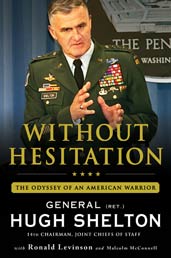And you thought the real war was between the U.S. military and the Taliban. Or the U.S. military and Saddam’s army inside Iraq? Actually, the most brutal conflict was between Army Gen. Hugh Shelton, chairman of the Joint Chiefs of Staff, and his boss — Secretary of Defense Donald Rumsfeld. That’s the bottom line in Shelton’s fat, 554-page autobiography out this week: Without Hesitation — The Odyssey of an American Warrior.

Gen. Hugh Shelton and his Secretary of "Deception and Deceit" / DoD
Shelton, you may recall, was the lanky special ops officer who served as the nation’s uniformed military chief from 1997 to 2001. He served three years in the Clinton Administration and for nearly a year under President George W. Bush and Rumsfeld, his tough-minded Pentagon boss. Shelton retired in October 2001, less than a month after 9/11. He doesn’t pull many punches. Some lowlights:
— Harry Truman revealed his guiding philosophy with his famous desktop plaque: The Buck Stops Here. I often thought Donald Rumsfeld’s should have said Don’t Tell Me, I Already Know.
— The problem arose when my analysis of the immediate threat posed by various countries did not concur with his own, and he became confrontational. “How can you not believe that China poses an immediate and direct threat at this time,” he asked.
— The fact is, we had Iraq contained and they were not a threat.
— Finally he asked me, “How do you view your job?”
That was easy because it’s specifically delineated by federal statute. “Mr. Secretary, I am the principal military adviser to you, the President, and the National Security Council, and also –”
“No, you are not the adviser to the National Security Council.”
“Well, I beg your pardon, but according to Title Ten of the U.S. Code, it states very clearly that –”
“But not the staff, not the staff.”
“No sir,” I answered, allowing him to save face when he realized that I had him by the balls since I knew exactly how the law defined my job…I thought to myself, We’re going to need some heavy-duty cleaning supplies if all we’re going to do is waste time having pissing contests like this.
— He was more concerned with marking his territory like a little bulldog than he was about getting down to the business of running the finest military force in the world.
— And there was the McNamara-Rumsfeld model, based on deception, deceit, working political agendas, and trying to get the Joint Chiefs to support an action that might not be the right thing to do for the country but would work well for the President from a political standpoint.
— It was the worst style of leadership I witnessed in thirty-eight years of service or have witnessed at the highest levels of the corporate world since then.
To some folks, this may seem like so much inside baseball. But it’s a startling peek at the dysfunction that permeated the U.S. military’s high command not so long ago. Can’t wait to see what Rumsfeld says in his autobiography, due out in January.



